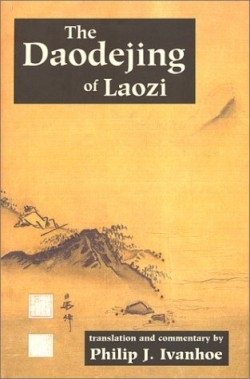The Daodejing of Laozi
Following catastrophic events, it is natural for people to claim the world has changed. So it has been following the events of September 11th. And yet, when reading the Daodejing one understands that such claims are simply one way that people respond to calamity. According to Daoist philosophy, such claims run counter to the true Dao, in which the balance of events, both light and dark, continues in ways beyond our perception.
One of the world’s oldest scriptures, the Daodejing, the author writes, “counsels everyone, but especially those in power, to be humble, frugal, and modest,” and to recognize that “The Way is hidden and without name.” One influenced by Daoist thought can simply regard historical events in a continuum in which the catastrophic takes its place beside the mundane.
Ivanhoe, professor of Chinese studies at the University of Michigan, translates the Daodejing into English that is both elegant and vernacular. His rendition of Laozi’s 6th-century B.C.E. work captures the brevity of poetry in language that feels particularly accessible, as in these lines from Chapter Twenty-three: “To be sparing with words is what comes naturally. /And so, / A blustery wind does not last all morning; / A heavy downpour does not last all day.” Ivanhoe achieves this concise common speech without sacrificing the mystery of the verses.
He also does not elevate his language into a pseudo-scriptural diction found in much inspirational literature but presents the Daoist ideals of humility, frugality, and modesty in his translations. For instance, Chapter Eighty-one begins: “Words worthy of trust are not refined; / Refined words are not worthy of trust.” One trusts Ivanhoe’s translations because one senses that he takes to heart Laozi’s dictum: “To know when to stop is how to stay out of danger.”
Ivanhoe not only presents an accessible translation of the Daodejing, he also gives, in his introduction, an erudite and concise history of Laozi and the Daodejing. For those unfamiliar with Daoist thought, Ivanhoe’s introduction places the scripture in the context of the classical Chinese world as well as its application in today’s world. His analysis helps the Western reader more fully appreciate the Daodejing’s very contradictory nature: “the paradoxical nature of the Daodejing, along with its poetic form, are themselves important parts of its message. The motivation for these stylistic features of the text is the belief that if we cannot reason our way out of certain problems, we can at least hope that wrestling with such paradoxes will exhaust our rational nature and loosen its grip on us. In such moments, alternative sources of insight and motivation within us can slip free and supply us with understanding.” In addition to the introduction, Ivanhoe provides an insightful appendix that examines the original Chinese and eight various English translations.
Ivanhoe’s translation of the Daodejing is clear and accessible and provides us with a timeless scripture to contemplate. “Look for it and it cannot be seen; / Listen for it and it cannot be heard; / But use it and it will never run dry.”
Disclosure: This article is not an endorsement, but a review. The publisher of this book provided free copies of the book to have their book reviewed by a professional reviewer. No fee was paid by the publisher for this review. Foreword Reviews only recommends books that we love. Foreword Magazine, Inc. is disclosing this in accordance with the Federal Trade Commission’s 16 CFR, Part 255.

